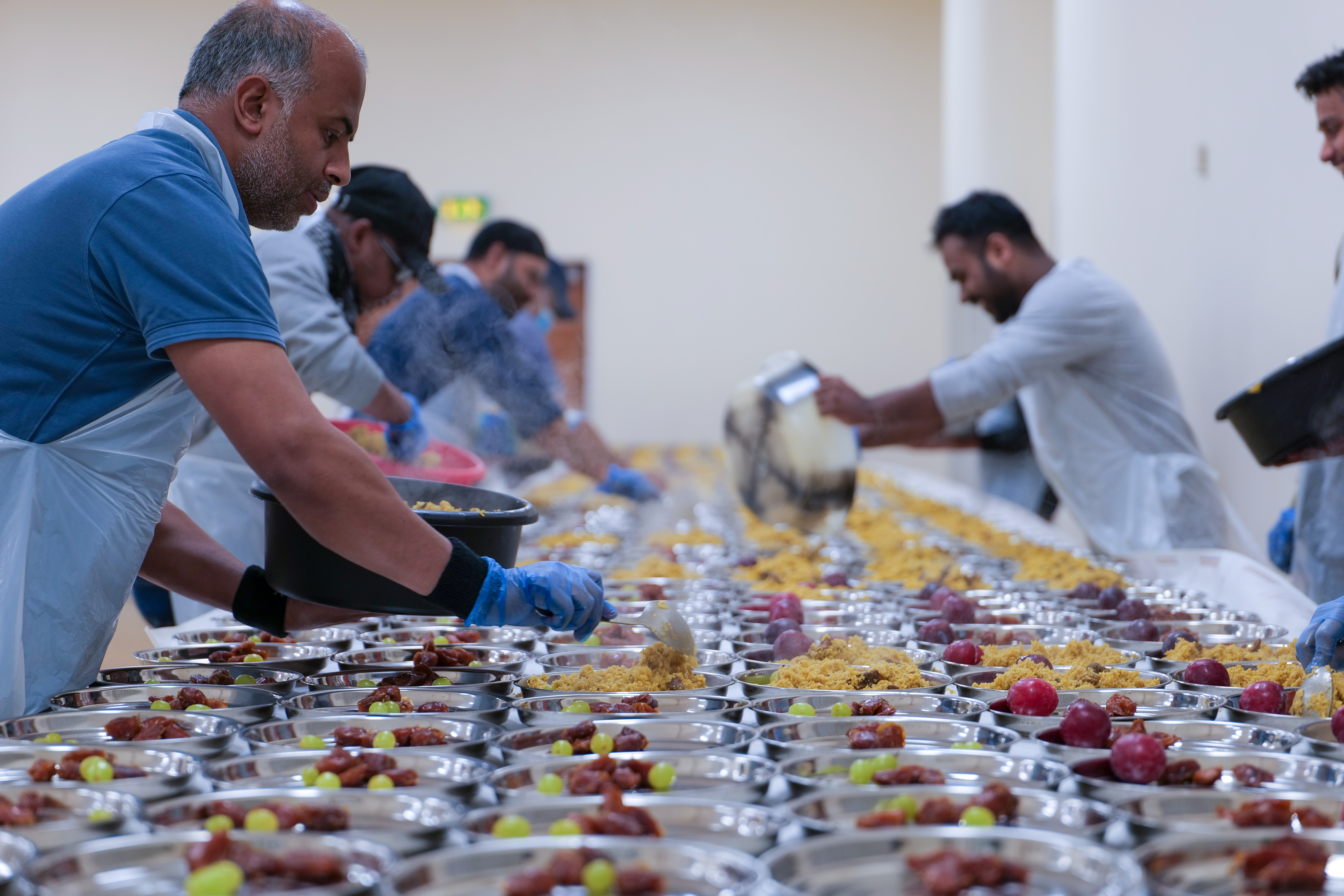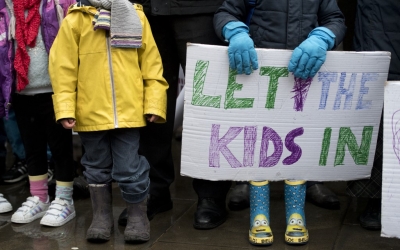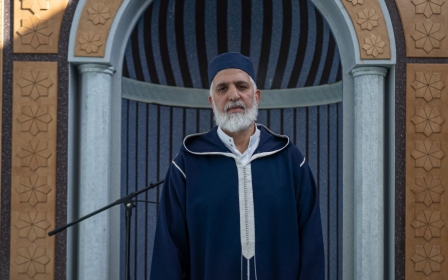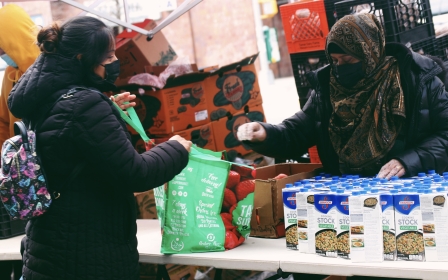Ramadan in the UK: Muslim charities hand out food as economic crisis bites
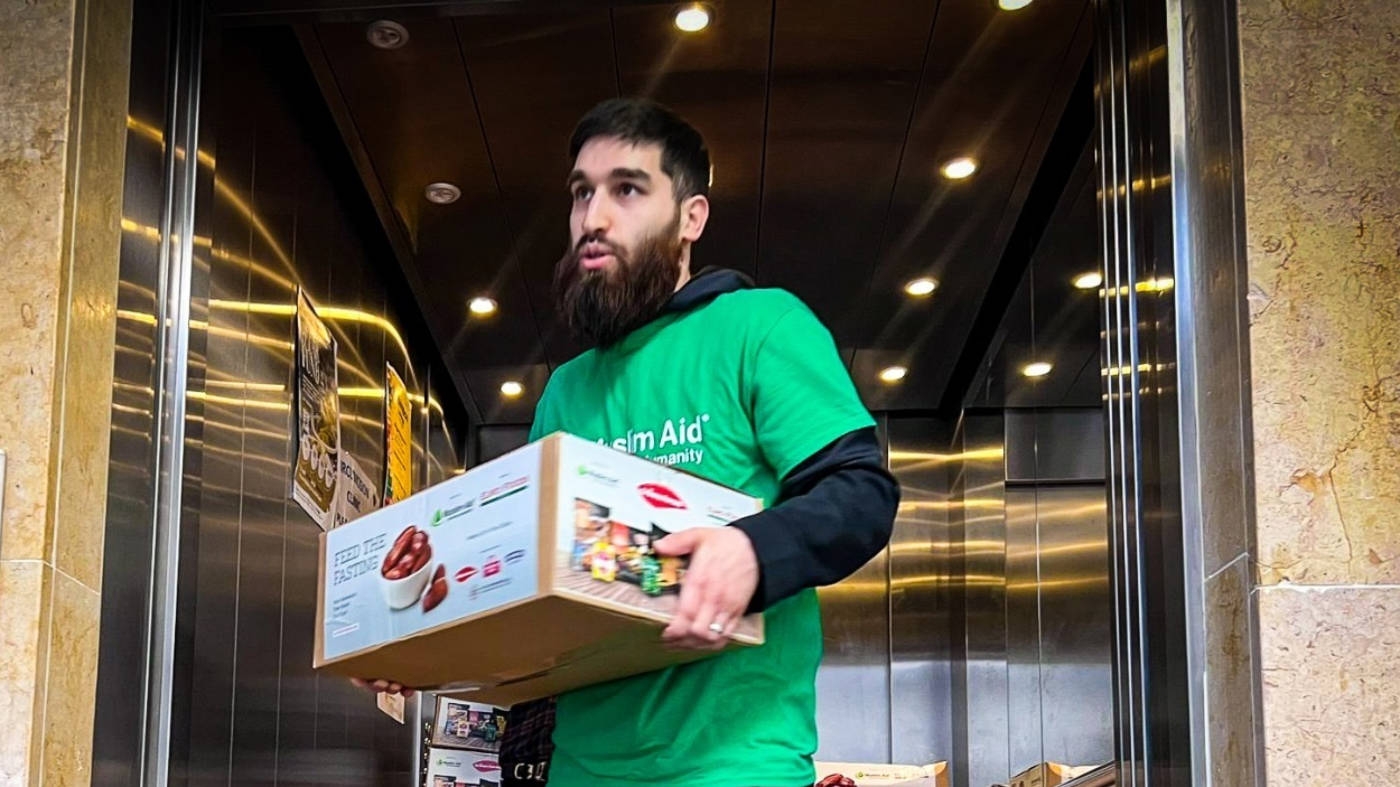
It's a grey afternoon on the eighth day of Ramadan, and lines of women, many with empty prams, are stood outside the East London Mosque in Tower Hamlets.
Some wear masks. Others wear scarves to cover their faces so no one can recognise them.
Soon they begin pushing their prams into the mosque's Maryam Centre, around the corner from the main entrance on the busy Whitechapel Road. From there, the women take the lift up to a disused floor.
But these women are not here to pick up children from the creche. They are here to collect food.
Since the Covid pandemic, the East London Mosque (ELM) has operated a food bank from inside its vast complex.
New MEE newsletter: Jerusalem Dispatch
Sign up to get the latest insights and analysis on Israel-Palestine, alongside Turkey Unpacked and other MEE newsletters
The project was initially set up in 2020 to help people, both Muslim and non-Muslim, who lost their jobs due to the lockdown, as well as deliver food to the elderly who were self-isolating for health reasons.
But the UK's worsening cost of living crisis - during which rising spiralling food and energy costs have seen inflation hit double digits - has pushed demand for the food bank's services to unprecedented levels, leaving volunteers struggling to meet the needs of a community suffering the highest levels of deprivation in the British capital.
'Having worked in Tower Hamlets for the thirty years, I have never seen anything like this level of poverty'
- Sufia Alam, Maryam Centre
Regarded by many measures as the poorest borough in London, Tower Hamlets, where the mosque is based, has the highest level of child poverty in the UK, at 56 percent of children in 2021. It is also home to a sizeable Bangladeshi and Somali Muslim community.
Sufia Alam, who manages projects at the Maryam Centre, said the number of people using the food bank and attending free iftar meals provided by the mosque was at an all-time high.
"Having worked in Tower Hamlets for the thirty years, I have never seen anything like this," Alam told Middle East Eye.
“I thought poverty like this only existed in the north where I am from, but in the past few weeks alone, we've been giving hundreds of food packs to people on benefits, in debt or struggling to pay the bills, and refugees housed in temporary accommodation."
Alam said that nearly a thousand people came to the centre every day to break their fast - double the numbers in previous years.
"On the first day of Ramadan, we ran out of food, with my volunteers running into the nearby Tesco to buy sandwiches for people so they could break their fast.”
Muslims hit by economic crisis
For Muslim communities, the cost of living crisis has been particularly challenging. Muslims donate millions of pounds to charitable causes each year, yet live disproportionately in the country's most deprived areas.
Data from the Office for National Statistics (ONS) showed that more than two-thirds of England and Wales's 2.6m Muslim population live in areas with high unemployment, calculated as an area where there are high numbers of people claiming unemployment benefits or else unemployed and actively seeking work.
Food prices in Britain are rising at the fastest rate in more than 40 years. In January, inflation for food and non-alcoholic beverages stood at 16.8 per cent. The ONS also noted that electricity prices in the UK rose by 66.7 per cent and gas prices by 129.4 per cent.
The problem has been further compounded as the price of essentials, such as rice and cooking oil, has risen by more than 10 percent during the last year. Ramadan staples including chapati flour and chickpeas have increased by nearly 20 percent.
This surge in costs disproportionately affects British Muslims, according to the UK's Agriculture and Horticulture Development Board, with 19 per cent of Muslims turning to food banks in the past year, compared with 11 percent of the overall population.
The National Zakat Foundation, a charity, has noted a 90 percent increase in applications to its hardship fund.
Siara Begum has been using the food bank at the East London Mosque for the last four to five months after her living costs tripled due to increases in her utility bills.
Sliding the mask from her face, she explained how the cost of living had made life difficult for her and her two young children.
“Never in my life did me or my friends imagine using a food bank,” said Begum. “Before, we could handle the costs, but when our bills went through the roof, I had to choose between heating or eating.”
The most significant increase Begum has noticed have been for cooking oil and rice - items which are not always found in non-Muslim food banks in the area, which typically stock goods like pasta and baked beans.
East London Mosque has also noticed growing numbers of refugees using its services, especially asylum seekers in hotels or temporary housing who cannot legally work while their asylum applications are processed.
UK Home Office figures show that 45,000 asylum seekers were in hotels across Britain, including Tower Hamlets, as of April 2023, with an undisclosed number living in temporary accommodation.
Alam said: "The main demographic we serve come from the Bangladeshi and Somali community, given the make-up of the borough. But there is a large group of Afghan refugees who live in hotels and temporary accommodation coming to us too.
"Most of these asylum seekers though have no access to kitchens so need access to hot meals or spaces that let them cook their food."
The demand for help from ELM has reached such levels that international NGOs like Muslim Aid and Human Appeal have begun distributing food for the first time in their histories.
While Human Appeal has launched a food parcel campaign in the UK, Muslim Aid approached ELM and teamed up with food distribution company Eurofoods to provide food packages in Tower Hamlets and other parts of the UK with high levels of deprivation.
The Ramadan packs Muslim Aid gives out include non-perishable items like rice, lentils, chickpeas and flour.
Muhammad Abul Kalam, who works at Muslim Aid as the head of income generation and marketing, grew up in Tower Hamlets. He said poverty has always been an issue in the borough but nothing like the levels he has witnessed during the last few months.
“When we grew up, we struggled with costs, but the scale of the problem and the number of people who need help, and kids going hungry, is alarming,” said Abul Kalam, speaking in the office that Muslim Aid uses inside the East London Mosque.
“That’s why we had to act. If we can deliver food to the furthest parts of the world, then the least we can do is give food here on our doorstep.”
Dignity and stigma
For Abul Kalam and Alam, the priority has always been preserving the dignity of those who need food so that they feel no shame.
"There's a stigma attached to asking people for help, and there's a lot of families [within the Muslim community] who are really proud to ask for help," said Abu Kalam.
"That's why we do it in a dignified way and work with East London Mosque to tell our recipients to come beforehand to a pre-approved location inside the mosque where they can pick up their packages discreetly."
Jahangir Mohammed, who provides analysis on Britain's charity sector for the Ayaan Institute, said the shift Muslim charities are taking to provide aid in the UK is part of a general trend of NGOs stepping in after cuts to government services.
'The only hope we have is that people give as much as they can to help those in the community who are less fortunate, otherwise it will get worse'
- Muhammad Abul Kalam, Muslim Aid
"Some of these charities always did work with local communities, but they are simply building upon the good work that many mosques have engaged in to help people in their locality," said Mohammed.
"These charitable activities would have been done by local groups helping the homelessness. But since a lot of the government and council funding has been cut, some charities have started to take up that work."
For now, Alam fears the problem will only worsen in the final weeks of Ramadan, which this year coincides with the two-week Easter school holiday.
UK-based charity Muslim Hands has also noticed a 25 per cent rise in users visiting their open kitchen in Hounslow. Another of its kitchens in Nottingham has been forced to limit the number of meals it can give out.
"We know during the Easter break, more and more people will be coming to the mosque for iftar and food because their kids will be at home and not at school where they will get at least one decent meal," said Alam.
"The only hope we have is that people give as much as they can to help those in the community who are less fortunate, otherwise it will only get worse."
Middle East Eye delivers independent and unrivalled coverage and analysis of the Middle East, North Africa and beyond. To learn more about republishing this content and the associated fees, please fill out this form. More about MEE can be found here.


